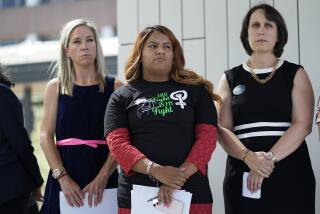Abortion rights advocates let their voices be heard
The subject was reproductive rights, the audience was fervently pro-choice and the panelists were activists from Planned Parenthood, the National Organization for Women and the ACLU.
But although the players may have been typical, the game plan was anything but.
What was billed as a political strategy session last month by the L.A. chapter of the National Council of Jewish Women seemed to unexpectedly open a new front in an old war over access to abortion:
Personal confession.
A mother of three announced from the stage that she’d had three abortions. A college student told the crowd that her mother had had one.
It was unnerving, and empowering. And I surprised myself by chiming in, sharing a decades-old memory of a relative whose back-alley abortion as a young woman left her unable to bear children.
These were the sort of declarations I thought only suited for private chats: tearful phone calls, death-bed confessions, late-night dorm room confabs.
But proponents of abortion rights have learned from abortion foes that personal stories help shape public opinion.
Tim Tebow, riding on his football fame, became a powerful voice against abortion by sharing the story of how doctors advised his mother to terminate a difficult pregnancy, but she refused and gave birth to him. Rick Santorum is considered a “pro-life” hero not just because of his politics but for his devotion to his disabled daughter.
Now women who have benefited from legal abortion — and those who have suffered from lack of access — are being encouraged to help bolster efforts to keep abortion legal by coming out of the closet.
That’s hard, but necessary, said Maggie Crosby, an ACLU lawyer. “Abortion has been so stigmatized that women don’t feel comfortable sharing their experiences even with close friends and family members.
“The fact that people don’t share makes it more stigmatized. We have got to break the grip that keeps us locked in that cycle.”
::
Studies suggest that by age 45, one in three women in America has terminated a pregnancy.
It’s an experience that’s private, personal and often painful. Many women feel guilty or conflicted. Some worry that others will judge and shame them.
Crosby remembers a Bay Area dinner with a crew of liberal cohorts. “One of the men said, perfectly sincerely, ‘I don’t know any women who’ve had abortions.’ And all of the men are nodding. And all of the women are rolling their eyes.”
Secrecy allows us to hold on to stereotypes; to presume that abortion is the province of the ignorant, the wanton, the cavalier.
“It’s important,” Crosby said, “for people to understand that these are their mothers, their sisters, their wives, their friends.... Women making serious decisions in difficult circumstances. Women who can be trusted with that.”
Still, almost 40 years after abortion was legalized, the subject is so fraught that the leader of a national abortion rights group thanked celebrities at a fundraiser last week “for having the courage to show up.”
Almost two dozen states have passed or are considering laws that would make birth control and abortion harder to access. And results of a recent national poll kicked up even more dust.
The Gallup Poll suggests that the percentage of Americans who call themselves “pro-choice” is at its lowest point since the survey first asked in 1995.
Back then, 56% identified as “pro-choice” and 33% as “pro-life.” Today, more than half of those surveyed say they are “pro-life,” and only 41% claim to be “pro-choice.”
The percentage of Americans who think abortion should be outlawed has remained steady for years at around 20%.
But more than half of those polled this year pronounced abortion “morally wrong.”
Planned Parenthood’s Serena Josel blames semantics: “The terms ‘pro-choice’ and ‘pro-life’ are such packed shorthand.
“They work in the political sphere to put people in categories. But these are intensely personal issues,” she said. “Those labels don’t leave much room for the complicated realities of people’s lives.”
The young women that Josel works with “have concerns that go beyond abortion, to contraception access, cancer screenings, healthcare they can trust and afford,” she said.
“A lot of them see themselves as pro-life and pro-choice. They would never choose in their lives to have an abortion. But they don’t think it’s right to restrict someone else’s choice.”
::
The movement has to engage those women. That’s where sharing stories comes in.
Our recollections are a way to educate a generation that can’t imagine being ashamed to ask for a pregnancy test just because there is no wedding ring.
Young women have grown up in California with the expectation of reproductive freedom — with mothers who put them on the pill at 16 and drugstore access to the morning-after Plan B. There are so many ways to not get pregnant, some see abortion as a consequence of carelessness, rather than a reprieve from misfortune.
Our values might match, but our language differs: They don’t recognize the shorthand Roe vs. Wade. Choice to them translates to consumer options, like whole milk or soy with that latte.
Nourbese Flint, 28, counsels high school girls in Los Angeles. Most of them are Latino or black, and many say they disapprove of abortion.
They think that’s for girls with loose morals, she said. “They don’t want to identify with that. They claim the label of pro-life. Until things happen to themselves or their friends.”
The push for reproductive rights has to bridge that gap between rhetoric and reality.
The shift was on display last week at a West Hollywood fundraiser for what used to be the National Abortion Rights Action League and is now NARAL Pro-Choice America.
President Nancy Keenan announced that she was stepping down this year “to make way for a new generation of leaders.” Dozens of young women in short skirts and platform heels set their cocktails down to sign pledge cards.
It won’t be as simple, of course, as changing a name or installing a young face at the helm.
“We have an obligation,” Keenan said, “to share our stories. And we have an obligation to listen to theirs.”
More to Read
Start your day right
Sign up for Essential California for news, features and recommendations from the L.A. Times and beyond in your inbox six days a week.
You may occasionally receive promotional content from the Los Angeles Times.






